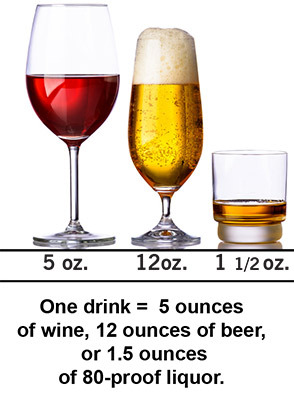
The effect of alcohol on your heart is complex. For some people, drinking even moderate amounts of alcohol causes major cardiovascular risks.
Researchers continue to study alcohol use and heart disease to learn more.
You may have heard that moderate alcohol consumption (red wine or beer) can help protect against heart disease. The Academy of Nutrition and Dietetics reports that, “Moderate drinking, along with a healthful eating pattern and regular physical activity, may offer health benefits...such as lower risk for heart disease, mostly for middle-aged and older adults.” However, until more is known about the pros and cons of drinking alcohol, the American Heart Association cautions people NOT to start drinking alcohol for better heart health. Talk to your doctor if you have questions about the benefits and risks of drinking alcohol.
How much alcohol is safe to drink?
According to both the American Heart Association and Academy of Nutrition and Dietetics, men should have no more than two drinks per day, and women should have no more than one drink per day. Excessive alcohol use is defined as drinking more than three drinks per day for men or women. A serving size is equal to 12 ounces of beer, 1.5 ounces of spirits or 5 ounces of wine.
When is alcohol use harmful?
Drinking any amount of alcohol can be dangerous if you have:
- A personal or family history of alcohol abuse.
- A personal or family history of liver disease or pancreatitis.
- Heart failure, cardiomyopathy, uncontrolled high blood pressure, irregular heart rhythm (arrhythmia), history of sudden cardiac death or stroke, or high triglycerides.
- Had a heart attack (alcohol can cause further damage to the heart muscle).
- Diabetes (alcohol affects your blood glucose level).
Check with your doctor if you aren’t sure if alcohol is safe for you.
Can alcohol interfere with medications?
If you take medications, especially antidepressants, antibiotics or pain medications, ask your doctor if it is safe for you to drink alcohol. Combining alcohol with some medications can keep the medications from working as they should and cause serious side effects. You should not drink alcohol if you are pregnant.
Alcohol and nutrition
Alcohol = "Empty" Calories. Alcohol does not provide any nutritional value to your diet. If you are trying to lose or control your weight, it is important to know how many calories alcohol can add to your diet. For example, having just one glass of wine per day (105 calories) can add ten pounds to your weight in one year.
What if I am worried about my drinking?
If you are concerned about how your alcohol use is affecting your health and your relationships with others, please talk with your primary doctor, cardiologist or one of Cleveland Clinic’s experienced chemical dependency nurses at 216.444.4836 or 800.223.2273 ext. 44836.